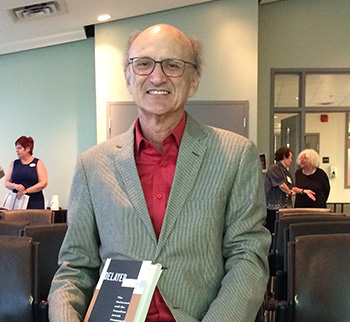When anti-Zionist sentiment began to rise in the early 2000s, the Canadian Jewish community chose to shut down a national organization governed by a diverse body of volunteers in favour of a group led by a small number of self-selected people, University of Toronto historian Frank Bialystok told an audience of about 30 people at the Miles Nadal Jewish Community Centre last week.
In the first lecture of MNJCC’s “Why Does History Matter Today?” series, Bialystok’s Sept. 12 talk examined the demise of Canadian Jewish Congress (CJC), the longstanding advocacy group for the Canadian Jewish community, and why the response to its dissolution in 2011, was, in his view, so muted.
Bialystok, a former chair of CJC’s Ontario region, traced the history of Jewish advocacy in Canada from 1919, when 25,000 Jews from across the country voted to send delegates to the first CJC convention, to 2011, when CJC was dissolved and the Centre for Israel and Jewish Affairs (CIJA) became the community’s main lobby group.
He noted that CJC initially existed for only about a year, during which time its major accomplishment was creating the Jewish Immigrant Aid Society, before a lack of funding and its administrative structure caused it to fall apart.
Congress was reconstituted in 1934, at which point what are now local Jewish federations had already come to the fore.
Bialystok said the period between 1967 and 2000 was characterized by competitiveness and overlapping mandates among Jewish organizations in Canada.
The ensuing power struggles, compounded by certain historical factors, can explain CJC’s fall from grace, he said.
In 1967, just before the Six Day War, Congress decided it needed a separate organization in Ottawa to lobby the federal government on behalf of Israel.
Thus, the Canada-Israel Committee (CIC) was created, in concert with federations and B’nai Brith.
Bialystok said that what had been, since the 1930s, a kind of “ongoing rivalry” between federations and Congress, at that point intensified due to a sense of “overlapping responsibilities” between them.
Then, in 2001, the UN World Conference Against Racism, held in Durban, South Africa, caused major alarm in the Jewish community when Zionism and Israel came under heavy attack.
“With the feeling that the whole world was ganging up on Israel and the perception that anti-Israel [sentiment] and anti-Semitism was growing in Canada, some of the large donors to federation said that things were in part so bad because the current structure for advocacy in Canada wasn’t working… they said Congress and the CIC weren’t cutting it,” Bialystok said.
Some of these donors pressured local federations to create what they felt would be a more efficient advocacy organization, he said. As a result, in 2004, the first incarnation of CIJA was born with what Bialystok said was “no consultation with anyone from Congress.”
CIJA was initially created as what he called a “super organization” that oversaw various constituency groups – Congress among them – but at its 2007 plenary meeting, Congress passed a bylaw stating that a certain number of representatives from CIJA and federations would now sit on its committees.
Bialystok said people from CJC felt they had no choice but to support these demands, as funding to Congress had already been significantly cut by federations.
He added that in 2010 and 2011, “promises were made … that human rights would remain a central pillar of CIJA and that senior staff at Congress would remain part of CIJA… [but] none of these promises were kept.”
The response to Congress’ demise was extremely subdued, Bialystok said, something he attributes to scant recognition from the press and the changing face of the Canadian Jewish community.
“The Canadian Jewish News didn’t really pick up on it… and the community wasn’t what it was during the latter part of the 20th century… the huge feeling now is the primacy of Israel… [and] the sense Israel is under constant threat and the entrenched legacy of the Holocaust, which took several generations to sink in among Canadian Jews.”
The latter concerns have eclipsed concerns about issues such as human rights, he said, noting: “CIJA is not a human rights organization. One wonders where CIJA stands on aboriginal affairs [or] on the [former] Conservative government in Canada having refused to allow medical care to refugees awaiting tribunals.”
